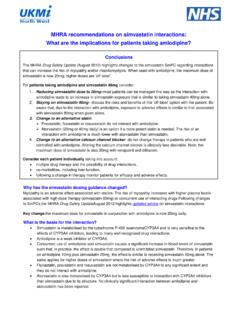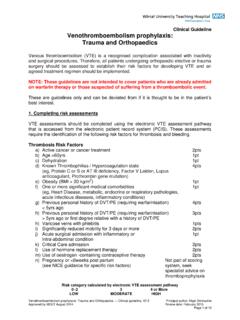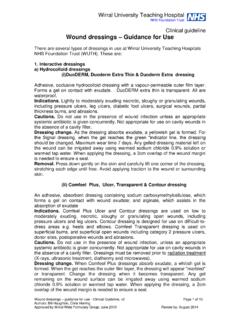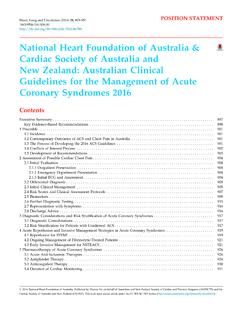Transcription of STOPP START Tool to Support Medication Review
1 Date of preparation Written by Checked by Date of next Review Version March 2015 Abigail Cowan Steve Riley March 2016 1 STOPP START Tool to Support Medication Review Older people are known to have increased risk of adverse effects with Medication due to age related alteration in pharmacokinetics and pharmacodynamics. This can sometimes lead to harm rather than benefit from a particular treatment. Polypharmacy and inappropriate prescribing are well known risk factors for adverse drug reactions (ADRs), which commonly cause adverse clinical outcomes in older people. 1 Systematic reviews and published evidence suggest some common drug groups associated with preventable drug related admissions especially in the ,3 Hence prioritising to Review these drug or drug groups helps reduce polypharmacy and the burden of ineffective or unnecessary treatment in the frail and elderly.
2 The recently published NICE guidance on Medicines Optimisation4 recommends using a screening tool for example the STOPP / START tool in older people to identify potential medicines-related patient safety incidents for those on multiple medicines or with long term conditions. This document is an adaptation of the STOPP START Medication Review screening tool ( STOPP -Screening Tool of Older Persons Prescriptions START -Screening Tool to Alert doctors to Right appropriate, indicated Treatments) Which aids physicians appraise older patient s Medication in the context of their current clinical condition 5. Eighteen experts in geriatric pharmacotherapy initially contributed to suggesting and then rating the criteria.
3 The tool was validated in patients aged 65 and over but physicians must use their clinical judgement when deciding if a person is elderly in terms of using the toolkit and also consider other drug interactions or contra - indications not listed here. The final decision to stop the drug should be weighed against the daily symptomatic benefit or prevention of rapid worsening of symptoms. Where there is any doubt with the above information please check that it is in line with manufacturers recommendations, published literature or changes in national and local guidance. All Wirral guidance can be found at or Adapted by Abigail Cowan, Prescribing Adviser North West Commissioning Support Unit with permission from STOPP / START Tool V9 Dr D O Mahony and Dr Simon Conroy ).
4 Acknowledgments also to NHS Cumbria STOPP / START Toolkit Feb 2013 & Leicestershire Medicines Strategy Group Nov 2014 (adapted with permission). Date of preparation Written by Checked by Date of next Review Version March 2015 Abigail Cowan Steve Riley March 2016 1 STOP medications (age 65 years) Circumstances to Review Reason to Review -blockers Long-term urinary catheter in situ >2 Months Not indicated Antibiotics Review IV antibiotics - ensure Review date has been discussed with microbiology (under OPAT team) with the aim to switch to oral if possible Long-term antibiotics for UTI prophylaxis Review individual patients as recommended by microbiology guidance at Risk of infected/phlebitic IV lines.
5 Increased risk of adverse effects and errors in preparation are significantly higher with parenteral drugs, compared to oral formulations. Increased patient discomfort and reduced mobility Refer to urology. Patients should be reviewed at regular intervals to assess the risk: benefits in relation to C. difficile infection. Prophylactic antibiotics should be reviewed after 6 months and stopping should be considered. Anticholinergics To treat extra-pyramidal side-effects of antipsychotic medications Risk of anticholinergic toxicity, including confusion and urinary retention Anticholinergic antispasmodics ( hyoscine butylbromide) For patients with chronic constipation Risk of exacerbation of constipation Antidiarrhoeal drugs (co-phenotrope, loperamide or codeine phosphate) For treatment of diarrhoea of unknown cause Please be aware of C.
6 Difficile in undiagnosed diarrhoea Risk of delayed diagnosis, may exacerbate constipation with overflow diarrhoea, may precipitate toxic mega colon in inflammatory bowel disease, may delay recovery in unrecognised gastroenteritis Antidiarrhoeal drugs (co-phenotrope, loperamide or codeine phosphate) For the treatment of severe infective gastroenteritis Risk of exacerbation or protraction of infection Risk of colitis and toxic mega colon if Clostridium difficile Antimuscarinics (bladder) Dementia or glaucoma or constipation or prostatism Risk of worsening respective condition NICE CG171 Urinary Incontinence in Women Joint Wirral Medicines Formulary Urinary Tract Disorders Antipsychotics 1 month use as long-term hypnotic (check notes for duration) Confusion, BP, extrapyramidal side effects, falls NB.
7 Reduce slowly monitoring effect 1 month use in parkinsonism Risk of worsening extrapyramidal symptoms If fallen in last 3 months For treatment of behavioural and psychological symptoms of dementia patients ( Review ongoing need) May cause gait dyspraxia, parkinsonism Risk of gait disturbances, dehydration, prolonged sedation, cognitive decline, falls, stroke and death Aspirin Dose 150mg / day, restart at 75mg if still indicated Risk of bleeding; no evidence of increased efficacy With a concurrent bleeding disorder High risk of bleeding Peptic ulcer disease without histamine H2 receptor antagonist or PPI If being used as monotherapy for stroke prevention in AF Risk of bleeding Guidance at: Benzodiazepines reduce slowly & monitor effect 1 month use of long-acting benzodiazepines, eg.
8 Chlordiazepoxide, oxazepam, diazepam, flurazepam, nitrazepam Risk of prolonged sedation, confusion, impaired balance, falls If fallen in last 3 months Date of preparation Written by Checked by Date of next Review Version March 2015 Abigail Cowan Steve Riley March 2016 1 STOP medications (age 65 years) Circumstances to Review Reason to Review Beta-blocker In combination with verapamil In those with diabetes mellitus and frequent hypoglycaemic episodes Risk of symptomatic heart block Risk of masking hypoglycaemic symptoms Beta-blocker (non-cardioselective) In patients with asthma Risk of bronchospasm Bisphosphonates (oral) Unable to sit upright / patient experiencing swallowing difficulties / compliance issues Instruction for administration of Medication if not followed causes increased risk of serious upper GI disorder Wirral Guidelines for the Management of Osteoporosis Calcium Channel Blocker If ankle oedema present This may be an adverse effect of the Calcium Channel Blocker see UKMI Q Verapamil and diltiazem should usually be avoided in heart failure They may further depress cardiac function and cause clinically significant deterioration.
9 Carbocisteine If no benefit after 4 weeks Unnecessary if no benefit shown Clopidogrel With concurrent bleeding disorder High risk of bleeding Corticosteroids Systemic instead of inhaled corticosteroids for maintenance therapy in moderate-severe COPD 3 months as monotherapy for rheumatoid or osteoarthritis Unnecessary exposure to long-term side effects of systemic steroids. Risk of major systemic corticosteroids side effects Digoxin At doses 125 microgram per day with impaired renal function (eGFR 50ml/minute) Can be increased levels of toxicity ( nausea, diarrhoea, arrhythmias) Dipyridamole monotherapy With concurrent bleeding disorder High risk of bleeding Diuretics (loop) Dependent ankle oedema and no signs of heart failure As first line monotherapy for hypertension No benefit.
10 Compression hosiery more appropriate Safer, more effective alternatives available Diuretics (thiazides) With history of gout Risk of exacerbating gout Domperidone indications except nausea/vomiting Underlying Cardiac conditions, impaired cardiac conduction, co-prescribed other medications known to prolong QT interval or potent CYP3A4 inhibitors or with severe hepatic impairment See MHRA warning issued Ipratropium (nebulised) Prescribing as required (prn) in addition to regular prescribing With glaucoma Can lead to exceeding licensed dosage and therefore exacerbate side effects May exacerbate glaucoma Laxatives stimulant ( bisacodyl, senna) For patients with intestinal obstruction Risk of bowel perforation Date of preparation Written by Checked by Date of next Review Version March 2015 Abigail Cowan Steve Riley March 2016 1 STOP medications (age 65 years) Circumstances to Review Reason to Review Metformin Renal impairment.











